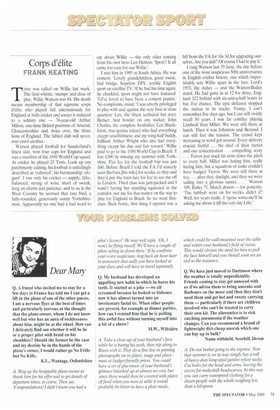Corps d'elite
FRANK KEATING
Time was called on Willie last week. The final whistle, 'stumps' and close of play. Willie Watson was 84. His death means membership of that supreme corps d'elite who played full internationals for England at both cricket and soccer is reduced to a solitary one — 76-year-old Arthur Milton, one-time Bristol postman of Arsenal, Gloucestershire and, twice over, the three lions of England. The fabled club will never, ever enrol another.
Watson played football for Sunderland's finest side, won four caps for England and was a member of the 1950 World Cup squad. At cricket he played 23 Tests. Look up any parchmenty cutting, his football is unfailingly described as 'cultured', his batsmanship `elegant'. I saw only his cricket — supple, lithe, balanced, strong of wrist, short of swank. long on charm and patience, and to us in the West Country he seemed that rare bird, a fully-rounded, generously sunny Yorkshireman. Apparently no one had a bad word to say about Willie — the only rider coming from his own hero Len Hutton: 'Sport? It all came too easy for our Willie.'
I met him in 1995 in South Africa. He was content: 'Lovely grandchildren, good music, bad bridge, hopeless DIY, terrific English sport on satellite TV.' If he had his time again, he chuckled, sport might not have featured: Td've loved to have been a concert pianist.' No complaints, mind: 'I was utterly privileged to play with and against the very best at close quarters: Len, the finest technical bat ever; Bedser, best bowler on any wicket; John Charles, the complete footballer; Len Shackleton, true-genius wizard who had everything except unselfishness; and my wing-half buddy, brilliant Arthur Wright who also had everything except his due and fair reward.' Willie paid to go to the 1950 World Cup in Brazil. 'I lost £300 by missing my summer with Yorkshire. Flat fee for the football trip was just £60. Before Brazil I told the FA I'd scarcely seen Barbara [his wife] for weeks, so they said they'd pay the train fare for her to see me off in London. Third class was jam-packed and I wasn't having her standing squeezed in the corridor, nor me for that matter on the way to play for England in Brazil. So we went firstclass. Back home, first thing I opened was a bill from the FA for 16s 3d for upgrading ourselves. Are you daft? Of course I had to pay it.'
I rang Watson last 29 June, the day before one of the most auspicious 50th anniversaries in English cricket history, one which imperishably sets Willie apart in the lore. Lord's 1953, the Ashes — and the Watson-Bailey stand. He had gone in at 12 for three, England 322 behind with six-and-a-half hours to bat. Fat chance. The epic defiance stopped the nation in its tracks: 'Funny, I can't remember five days ago, but I can still vividly recall 50 years. I was far comfier playing Lindwall than Miller. We were still there at lunch. Then it was Johnston and Benaud. I can still feel the tension. The crowd kept increasing as word got around. Every delivery crucial, fretful . . . the duel of their tactics and our concentration . . compelling, scary . . Trevor just stuck his nose down the pitch to every ball. Miller was hating him, really hating him, but a squadron of tanks couldn't have budged Trevor. We were still there at tea. . . after that, daylight, and then we were sailing into a glorious sunset. . Watson 109, Bailey 71. Match drawn — for posterity. The hubbub went on for weeks, didn't it? Well, for years really. I 'spose someone'll be asking me about it till the very day I die.'












































































 Previous page
Previous page